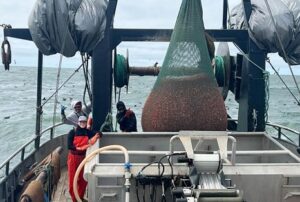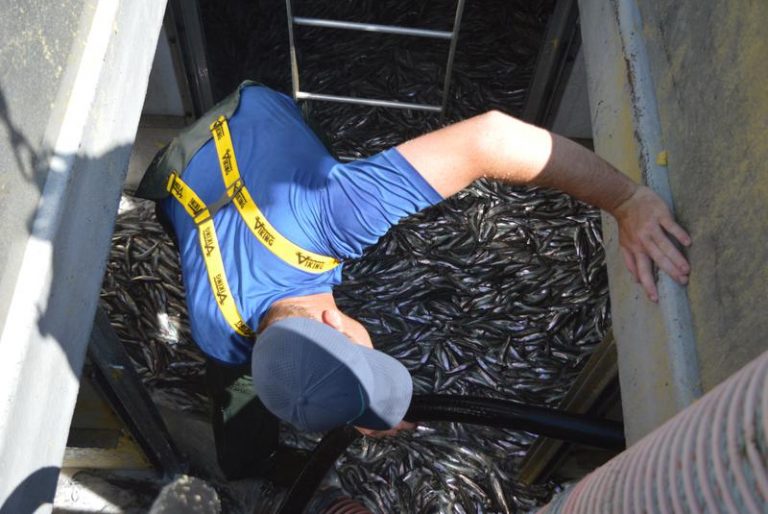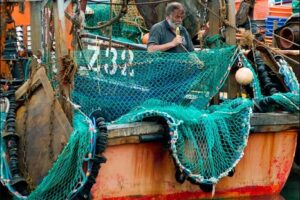Tag Archives: StarKist
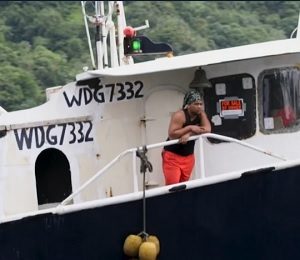
Video: A sea of obstacles imperil American Samoa’s tuna industry
Locally based fishermen who supply the lone Starkist tuna cannery in American Samoa are facing a perfect storm of obstacles that are threatening their economic survival. A battle is now on in the U.S. territory to fend off those looming challenges, from rising fuel costs to international competition.,, Carlos Sanchez is a veteran longliner, but he’s in the process of giving it up. “All my boats are for sale. I have seven boats, and they are for sale.” You have no hope for the industry? “We have no help for the industry!…” Video, >click to read< 08:43

Starkist Hit With $100M Fine in Seafood Price-Fixing Scheme
Starkist must pay a $100 million criminal fine for conspiring to fix packaged seafood prices, a federal judge ruled Wednesday, despite arguments it could bankrupt the company or cause its employees to lose jobs. “I think it’s in the interest of the economy not to bankrupt Starkist, but the court has the leverage to extend the payments out,”,, Starkist general counsel and senior vice president Robert Scott Meece said the company has about 100 employees at its Pittsburgh headquarters and 2,100 working at a factory in American Samoa. “These employees have had this hanging over their heads for a long time,” >click to read< 12:00

StarKist to Plead Guilty to Price Fixing and Face $100 Million Fine
StarKist agreed to plead guilty on Thursday to one felony charge of price fixing for its role in a broad conspiracy to rig the price of canned and ready-to-eat tuna, the Justice Department said. The company faces a fine of up to $100 million for forcing shoppers to pay inflated prices from at least November 2011 through December 2013, the Justice Department said. >click to read>13:16
Tuna producers up to something fishy as they face conspiracy allegations
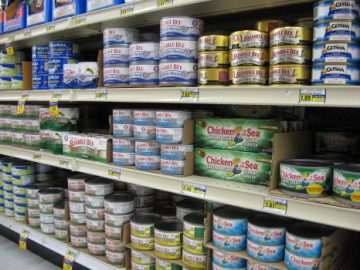 Executives of the most popular tuna brands in the U.S. — Chicken of the Sea, Bumble Bee and StarKist — conspired regularly to keep prices high for consumers with a taste for one of America’s favourite sandwich ingredients, according to criminal and civil court records updated this week. A typical can of tuna today costs about $1.50 and the U.S. Department of Justice says that price may be the result of price fixing by Thai, South Korean and U.S. seafood dealers, while major retailers are suing alleging they’ve been ripped off. The U.S. government began investigating criminal price fixing between the three companies more than two years ago. Together the companies supply about 80 per cent of the $1.7 billion of canned tuna sold annually in the United States, according to the court records. Following up, Walmart and other top retailers filed civil lawsuits. Click here to read the story 17:14
Executives of the most popular tuna brands in the U.S. — Chicken of the Sea, Bumble Bee and StarKist — conspired regularly to keep prices high for consumers with a taste for one of America’s favourite sandwich ingredients, according to criminal and civil court records updated this week. A typical can of tuna today costs about $1.50 and the U.S. Department of Justice says that price may be the result of price fixing by Thai, South Korean and U.S. seafood dealers, while major retailers are suing alleging they’ve been ripped off. The U.S. government began investigating criminal price fixing between the three companies more than two years ago. Together the companies supply about 80 per cent of the $1.7 billion of canned tuna sold annually in the United States, according to the court records. Following up, Walmart and other top retailers filed civil lawsuits. Click here to read the story 17:14
American Samoa: It’s happening, purse seiners are tying up
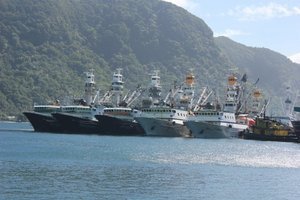 At least 14 US purse seiners out of 37 that are licensed to fish under the US South Pacific Tuna Treaty are idling their operations following a directive from the National Marine Fisheries Service (NMFS) that all US vessels in the Western Pacific Ocean under the Treaty are to cease operations as of December 31st. That prohibition is to remain in effect until the Pacific Island Forum Fisheries Agency (FFA), issues licenses for 2016, which hinges on a new agreement with the Parties to the Nauru Agreement. Read the article here 10:29
At least 14 US purse seiners out of 37 that are licensed to fish under the US South Pacific Tuna Treaty are idling their operations following a directive from the National Marine Fisheries Service (NMFS) that all US vessels in the Western Pacific Ocean under the Treaty are to cease operations as of December 31st. That prohibition is to remain in effect until the Pacific Island Forum Fisheries Agency (FFA), issues licenses for 2016, which hinges on a new agreement with the Parties to the Nauru Agreement. Read the article here 10:29
Mutiny on the Majestic Blue – A captain held captive by his own crew. A boat flying the U.S. flag but violating every American law
 Captain wanted. No experience necessary. The ad described a gig as master of a Western Pacific tuna fishing boat, an American ship with a crew of 24 men. The vessel was a purse seiner, a steel-hulled fishing boat that used a gigantic rectangular net that closed like a drawstring purse to catch tuna for StarKist, America’s most popular tuna brand. He sent an email. Less than 15 minutes later he had a response. It didn’t come from the address listed, but from someone at a Korean company called Dongwon. “When can you be here?” the email asked. Read the rest here 16:58
Captain wanted. No experience necessary. The ad described a gig as master of a Western Pacific tuna fishing boat, an American ship with a crew of 24 men. The vessel was a purse seiner, a steel-hulled fishing boat that used a gigantic rectangular net that closed like a drawstring purse to catch tuna for StarKist, America’s most popular tuna brand. He sent an email. Less than 15 minutes later he had a response. It didn’t come from the address listed, but from someone at a Korean company called Dongwon. “When can you be here?” the email asked. Read the rest here 16:58
Starkist Class Action Settlement Means Customers Get $25 In Cash Or $50 In Tuna
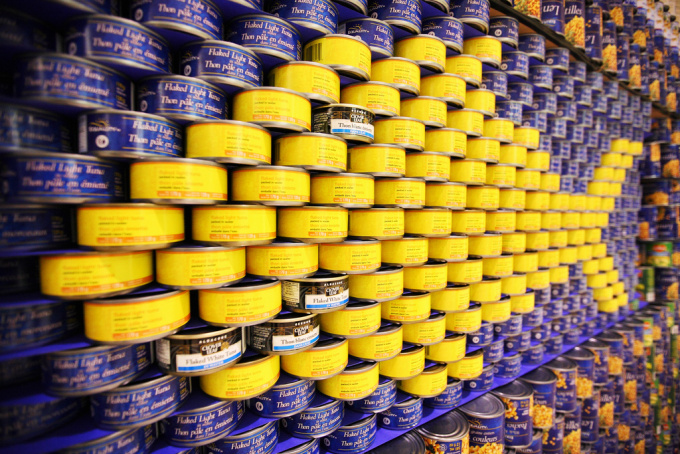 Two and a half years ago, a man who eats tuna filed a class action lawsuit against Starkist, a tuna company. His allegation was that the company was deliberately under-filling each can by a few tenths of an ounce. That might not make a difference to one consumer making one tuna salad, but would add up over millions of cans. While Starkist doesn’t admit fault, the case has been settled. If you’re a resident of the United States and bought at least one five-ounce can of any of these tunas from Starkist between February 19, 2009 and October 31, 2014, you’re eligible to file a claim: Read the rest here 13:28
Two and a half years ago, a man who eats tuna filed a class action lawsuit against Starkist, a tuna company. His allegation was that the company was deliberately under-filling each can by a few tenths of an ounce. That might not make a difference to one consumer making one tuna salad, but would add up over millions of cans. While Starkist doesn’t admit fault, the case has been settled. If you’re a resident of the United States and bought at least one five-ounce can of any of these tunas from Starkist between February 19, 2009 and October 31, 2014, you’re eligible to file a claim: Read the rest here 13:28
Big Three Conspire to Fix U.S. Tuna Prices, Wholesaler Says in Antitrust Class Action
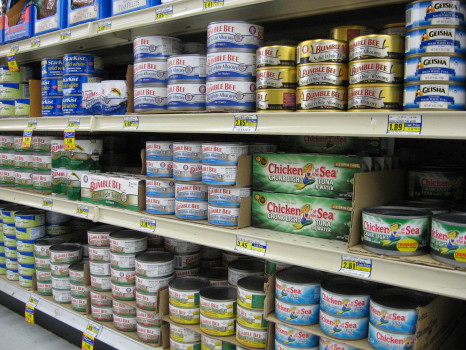 The “oligopolistic structure” of the nation’s three largest packed-seafood companies – StarKist, Bumble Bee and Tri-Union – helps them conspire to fix tuna prices, a class of wholesalers claim. Olean Wholesale Grocery Cooperative filed the federal complaint Monday against Bumble Bee Foods, Tri-Union Seafoods and StarKist. Tri-Union, the only name that may be unfamiliar to U.S. consumers, sells its canned fish under the trade name Chicken of the Sea. Read the rest here 19:42
The “oligopolistic structure” of the nation’s three largest packed-seafood companies – StarKist, Bumble Bee and Tri-Union – helps them conspire to fix tuna prices, a class of wholesalers claim. Olean Wholesale Grocery Cooperative filed the federal complaint Monday against Bumble Bee Foods, Tri-Union Seafoods and StarKist. Tri-Union, the only name that may be unfamiliar to U.S. consumers, sells its canned fish under the trade name Chicken of the Sea. Read the rest here 19:42
Starkist CEO hits back at Bumble Bee ‘buy American’ comments
 Frank Pogue, vice president of marketing and corporate affairs for Starkist, hit back at comments from Bumble Bee Foods CEO, Chris Lischewski, over rules on who can supply US government food contracts. Starkist — which defended its “Made in America” claim to Undercurrent News last year — and Tri Marine International are clashing with Bumble Bee Foods and Chicken of the Sea over the US Department of Agriculture’s (USDA) strict “buy American” standards for where tuna is cleaned, canned and shipped, reported the The Hill, on Jan. 8. Read more@undercurrent 07:59
Frank Pogue, vice president of marketing and corporate affairs for Starkist, hit back at comments from Bumble Bee Foods CEO, Chris Lischewski, over rules on who can supply US government food contracts. Starkist — which defended its “Made in America” claim to Undercurrent News last year — and Tri Marine International are clashing with Bumble Bee Foods and Chicken of the Sea over the US Department of Agriculture’s (USDA) strict “buy American” standards for where tuna is cleaned, canned and shipped, reported the The Hill, on Jan. 8. Read more@undercurrent 07:59
StarKist commits to further investment in 50th year
 StarKist, the parent company of StarKist Samoa, says as it celebrates 50 years of StarKist Samoa, it has a strong interest in continuing its commitment to the territory and this includes further investment in its local operations. Read more
StarKist, the parent company of StarKist Samoa, says as it celebrates 50 years of StarKist Samoa, it has a strong interest in continuing its commitment to the territory and this includes further investment in its local operations. Read more





































